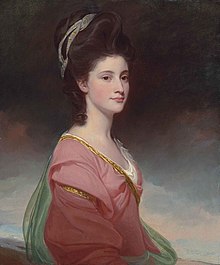Maria III Tullia
| Maria III & II | |||||
|---|---|---|---|---|---|
 | |||||
| Latin Empress (more...) | |||||
| Reign | 11 November 1765 – 17 July 1803 | ||||
| Coronation | 25 December 1765 | ||||
| Predecessor | Constantine XVIII & I | ||||
| Successor | John XI | ||||
| Queen of Sydalon (more...) | |||||
| Reign | 11 November 1765 – 17 July 1803 | ||||
| Anointing | 3 February 1766 | ||||
| Predecessor | Constantine XVIII & I | ||||
| Successor | Elissa III | ||||
| Co-Prince of Ascalzar (more...) | |||||
| Reign | 11 November 1765 – 17 July 1803 | ||||
| Predecessor | Constantine XVIII & I | ||||
| Successor | Elissa III | ||||
| Born | 8 May 1726 Palatium Purpura, Ascanium, Latium | ||||
| Died | 17 July 1803 (aged 77) Palace of Augustus, Palatine, Castellum ab Alba | ||||
| Burial | Sanctus Andreas Cathedral, Ascanium | ||||
| Spouse | Prince Michael of Ghant (m. 1745) | ||||
| Issue |
| ||||
| |||||
| House | Tullia | ||||
| Father | Constantine Tullius | ||||
| Mother | Maria II & I | ||||
| Religion | Fabrian Catholic | ||||
Maria III (Fausta Tullia Isabella Maria Sophia Caesaris; 8 May 1726 –17 July 1803) was the 109th Latin Monarch, Queen of Sydalon, and Co-Prince of Ascalzar, reigning from 1765 until 1803.
Maria was born during the reign of grandfather Latin Emperor John X, and was the second child of the future Latin Empress Maria II and her consort, Constantine Tullius. She was primarily raised under the care of her mother, who was noted to be very protective of her children and often overbearing according to courtiers. In 1744, she was betrothed to Prince Michael of Ghant, whom she married in 1745. She and her husband resided in Latium throughout their marriage, and primarily resided in Sydalon when she became heir presumptive. She took the throne following the short reign of her elder brother, Constantine XVIII, who lacked any legitimate children, becoming the second Empress regnant in less than ten years.
As Empress, Maria battled low popularity early in her reign due to her time spent abroad throughout her marriage, and her husband's Ghantish and Latin ancestry. This changed due to her reputation for shrewd dealings with the Senate, charitable relationship with the common folk and the Church. Her son, and successor, John XI, initiated the House of Gentilius line of his father.